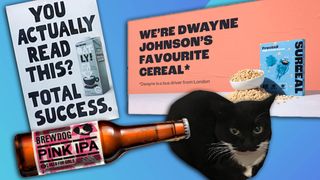Finding the right tone of voice for a brand can be a minefield. In recent years, there's been a trend towards a more informal, knowing and even sarcastic approach. But while this mirrors a tendency to more casual presentation and communication in wider society, sometimes it can be as cringeworthy as school teacher trying way too hard to be 'down with the kids'.
It's a tough balance to get right, and the brands below have demonstrated just how fine the line is between sounding refreshingly frank and gratingly forced. They could perhaps take some lessons from the best branding books.
01. Oatly's irritating Reddit ad

"Your advertising campaigns are consistently the most grating and pathetic faux-cool b*llsh*t. I am actively hostile toward your brand." Ouch, I don't think this is the kind of response that Oatly was hoping for when it took out an ad on Reddit. The brand was already getting on people's nerves with its 'corporate irreverence', but this facetious post, in which it claimed to have just discovered email marketing, rubbed a lot of people up the wrong way.
Other gems from the oat drink brand include posters with phrases such as 'Waiting for someone? Just look cool and pretend to be reading this,' 'Posters don't have feelings so you don't have to pretend that you're interested.' and 'you actually read this? Total success'. They don't seem to get that deriding the marketing and advertising industries doesn't really work when you're so active in them.
02. Surreal's 'celebrity' billboards

Surreal is a cereal manufacturer that waves its challenger brand status like a huge big flag – in pastel hues, of course. Happily, the results have been less irritating than Oatly's efforts, raising a smile with its cheeky use of mock endorsements from everyday people with celebrity names.
The audacious campaign featured glowing endorsements from the likes of Serena Williams, Dwayne Johnson and Michael Jordan – all ordinary people who just happen to have the same names as international celebs. Clarification is provided by way of an asterisk and smaller print below the display copy. It works, getting the attention of newcomers to the brand, but it's verging on the annoying.
03. Clancy's Auto Body's Maxwell the Cat posts
@clancysautobody (opens in new tab) ♬ original sound - keeern (opens in new tab)
One of the reasons that deliberately bad marketing can be so annoying is that in many cases it's simply not credible. While Oatly and Surreal may be small brands compared to say Kellogg's or Nestlé, they're not exactly tiny startups either. Their advertising can feel contrived because it tries to give the impression of being improvised when its very existence tells us that there's a professional marketing team behind it.
The irreverent approach can be more believable when it comes from a brand that nobody's heard of. Clancy's Auto Body, for example. This Fort Lauderdale body shop went viral on TikTok, one of the most difficult platforms for brands to break, thanks to comedy and Maxwell the Cat. It's going to need to start mixing in more serious content, but this is one case where the unprofessional approach doesn't feel out of place.
04. Almost anything from Brewdog

The Scottish brewery Brewdog has long presented itself as a punk rebel shaking up the industry. But while it can be seen as something of an upstart taking on the big international beer brands of old, its attempts to be edgy sometimes fall flat. An early design for its entry into the whisky market was described on Twitter as "about as punk as Songs of Praise" and "the leather-jacketed, sports car driving, recently divorced, middle-aged Dad of whisky bottles".
But its biggest fail was when it tried to satirise sexist marketing tropes. We can see how it might have sounded like a clever idea. Launch an intentionally sexist 'Pink IPA' with the brand's typical sarcasm, and everyone will laugh and realise how awful it is to market pink products to women (often with price markups) and that men and women should receive the same salaries.
The brand had its heart in the right place, making its own commitment to equal pay, but the mixture of sarcasm and a serious message was just confusing and led to the brand being accused of adding to the problem it was critiquing.
There can be a place for irreverence in marketing, even among bigger brands, but it's difficult to get right. And the bigger the brand, the harder it is to make it sound genuine. For every new customer whose attention it might win, there's very probably someone else out there who will become "actively hostile" to the brand.
Read more:


